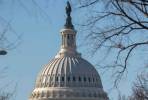EDITORIAL: End lawmakers’ lobby hobby
Election to Congress is a golden ticket, essentially a guarantee of lifetime job security in Washington. The more former lawmakers we have, the more lobbyists we get, and the more lobbyists we have, the more spending we get. Breaking this vicious, costly cycle will take more than electing a genuine fiscal conservative as president. No, to dial back the size of Washington, we have to shut the revolving door forever. And one freshman lawmaker has an idea to do just that.
According to current law, House members must wait at least a year — and former senators at least two years — after leaving office before they can become lobbyists. But Rep. Rod Blum, R-Iowa, took it up a notch last week, introducing legislation that would prevent members of Congress from ever becoming lobbyists once they leave office. Blum, who established the Congressional Term Limits Caucus and supports legislation to prevent members of Congress from flying first class, says the bill would go a long way toward limiting lobbyists’ influence on the legislative process and removing the pressure members of Congress feel to cater to their wishes.
“This bill would finally close the revolving door between Congress and special interest groups, restoring integrity to our political system and ensuring that politicians focus on representing their constituents instead of catering to lobbying groups who offer a lucrative post-electoral career,” Rep. Blum said in a statement. “This lifetime ban on lobbying is another step in that effort to make Congress more accountable to the people by reducing the incentive for our elected officials to use their position for their own personal gain.”
Rep. Blum’s bill isn’t retroactive — if passed, the lobbying army wouldn’t shrink anytime soon — but it’s a good start. It is also especially timely considering the unprecedented influence lobbyists have on our political process. According to the Washington Examiner, lobbying has grown in direct proportion with government spending, with special interest groups consistently spending nearly $1 million for every billion dollars in federal expenditures. The Examiner suggested that while the left-of-center likes to portray K Street lobbyists as the chief villains wreaking havoc in our nation’s capitol, the left’s big government policies are attracting them.
As federal spending grew from $1.7 trillion in 1998 to $3.5 trillion in 2010, thanks to President Barack Obama’s stimulus plan, money spent on lobbying rose from $1.5 billion to $3.6 billion during the same time period. As lawmakers create new government programs and jack up spending on existing ones, companies and activist groups have organized lobbyists, led by former lawmakers, to cash in on the windfalls. There is no doubt this revolving door stimulates federal government growth.
The new Republican majority in Congress needs to address this incestuous cycle. Either GOP lawmakers are serious about reducing government spending and delivering a check on federal power — like they love to tell us they are — or they’re not. If they don’t pass Rep. Blum’s bill, voters will know they’re as committed to big government and their own self-interest as Democrats are.























